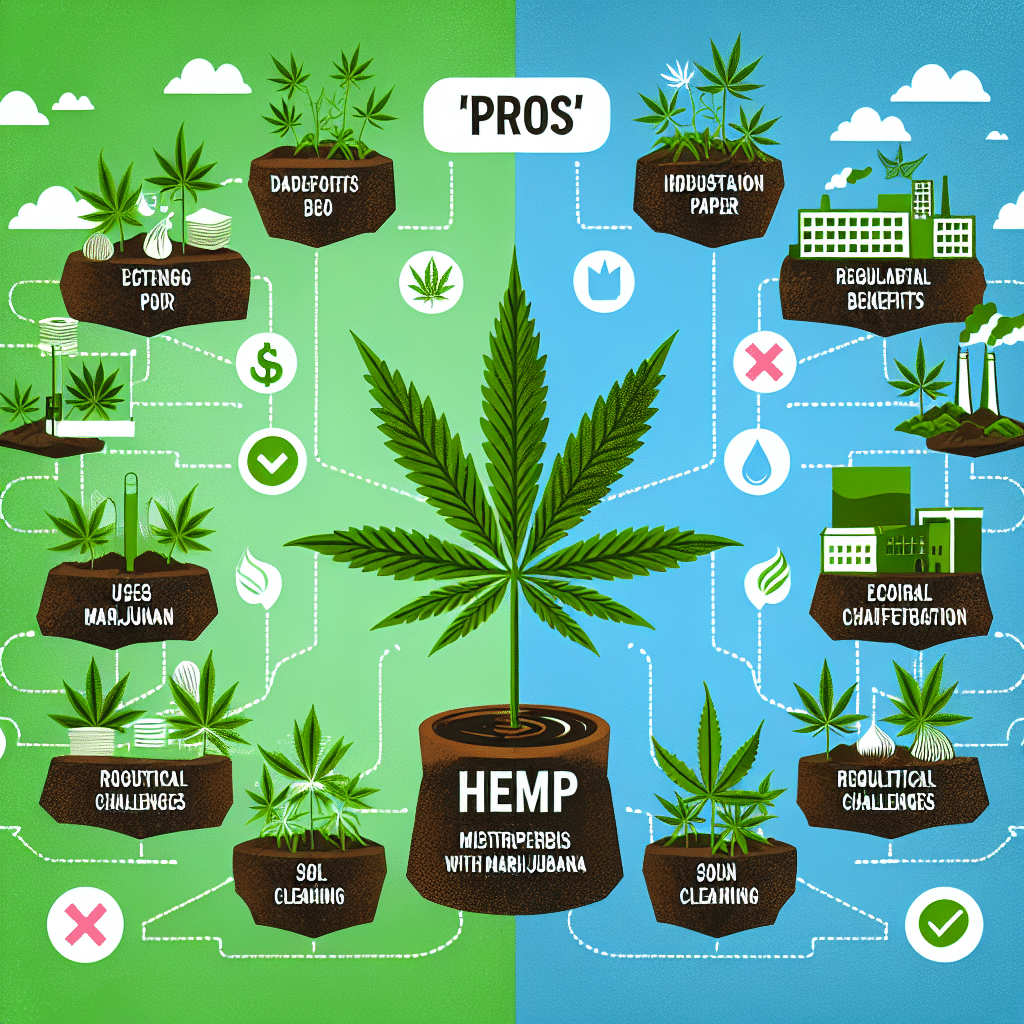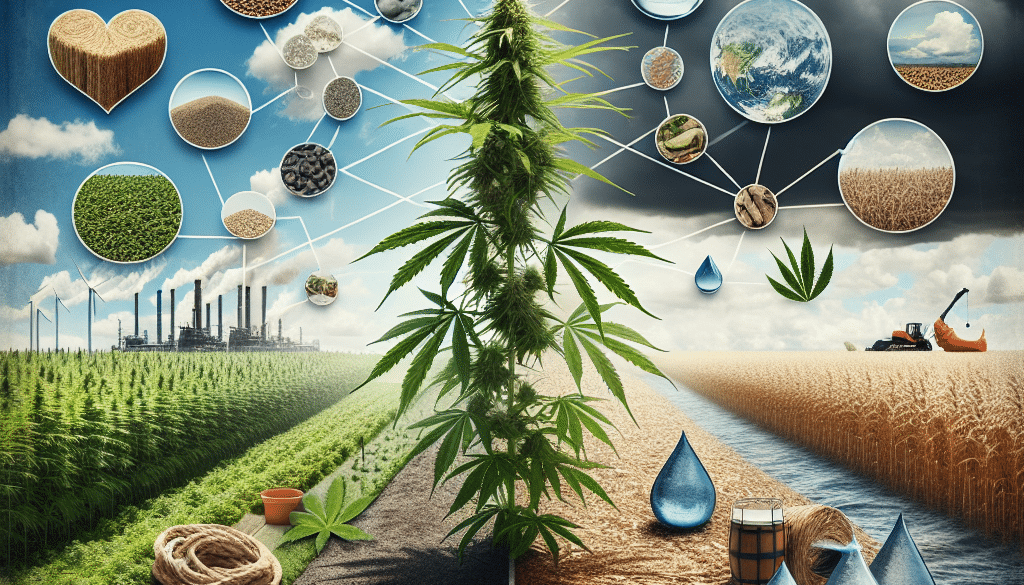What Are The Pros And Cons Of Hemp?
-
Table of Contents
Hemp: Weighing the Pros and Cons for a Sustainable Future

Hemp, a plant with a history as rich as its potential applications, has been both lauded and criticized over the years. As the world becomes more environmentally conscious, hemp is often presented as a miracle crop that can solve numerous sustainability issues. However, like any agricultural product, it comes with its own set of advantages and disadvantages. In this article, we will explore the pros and cons of hemp, providing a balanced view of its role in our society.
The Advantages of Hemp
Hemp boasts a plethora of benefits that span various industries, from textiles to construction, and even nutrition. Here are some of the most significant advantages:
- Sustainability: Hemp is a highly sustainable crop. It requires less water than traditional crops like cotton and doesn’t need high levels of pesticides or herbicides. This makes it a more eco-friendly option.
- Carbon Sequestration: Hemp plants are effective at capturing carbon dioxide from the atmosphere, which can help combat climate change.
- Biodiversity: Hemp cultivation can support biodiversity as it provides a habitat for various wildlife species.
- Versatility: Hemp can be used to make a wide range of products, including paper, clothing, biodegradable plastics, and even building materials like hempcrete.
- Soil Health: Hemp has deep roots that can help prevent soil erosion and improve soil health by aerating the soil and replenishing vital nutrients.
- Economic Potential: The hemp industry offers economic opportunities through its diverse applications, potentially creating jobs in agriculture, manufacturing, and retail.
- Nutritional Benefits: Hemp seeds are a source of complete protein, containing all nine essential amino acids, as well as omega-3 and omega-6 fatty acids, making them a valuable food source.
The Disadvantages of Hemp
Despite its many benefits, hemp also faces several challenges and drawbacks that must be considered:
- Legal and Regulatory Challenges: Hemp’s association with marijuana has led to legal barriers in many countries, which can hinder its cultivation and sale.
- Cross-Pollination Issues: Hemp can cross-pollinate with related plants, which can be problematic for both hemp and marijuana growers.
- Market Limitations: The market for hemp products is still developing, and there may be limitations in consumer demand and processing infrastructure.
- Knowledge Gap: Due to its historical legal status, there is a lack of modern research and farming knowledge, which can affect crop yields and quality.
- Harvesting Challenges: Hemp’s tough fibers can be difficult to harvest and process, requiring specialized equipment.
Environmental Impact of Hemp
The environmental impact of hemp is generally positive, especially when compared to other crops. Its low water and pesticide requirements make it an attractive option for sustainable farming practices. Additionally, hemp’s ability to grow in a variety of climates and soil types allows for cultivation in areas where other crops might not thrive, potentially reducing the need for deforestation and land degradation.
Economic and Social Implications
The economic and social implications of hemp are vast. As a cash crop, hemp has the potential to revitalize rural economies and provide farmers with an alternative revenue stream. The growth of the hemp industry could also lead to increased investment in research and development, further expanding its applications and benefits.
Conclusion: A Balanced View on Hemp
In conclusion, hemp presents a compelling case as a multi-purpose crop with significant environmental and economic benefits. However, it is not without its challenges. Legal hurdles, processing difficulties, and market limitations are all factors that need to be addressed for hemp to reach its full potential. As the industry matures and more research is conducted, we can expect to see hemp play an increasingly important role in sustainable agriculture and product development.
Discover the Benefits of Hemp with ETprotein’s Protein Products
If you’re interested in the nutritional benefits of hemp, ETprotein offers a range of high-quality protein products that can help you incorporate this superfood into your diet. Their organic bulk vegan proteins are an excellent source of complete protein and essential fatty acids, perfect for anyone looking to enhance their health and wellness through natural, plant-based options.
About ETprotein:
ETprotein, a reputable protein and L-(+)-Ergothioneine (EGT) Chinese factory manufacturer and supplier, is renowned for producing, stocking, exporting, and delivering the highest quality organic bulk vegan proteins and L-(+)-Ergothioneine. They include Organic rice protein, clear rice protein, pea protein, clear pea protein, watermelon seed protein, pumpkin seed protein, sunflower seed protein, mung bean protein, peanut protein, and L-(+)-Ergothioneine EGT Pharmaceutical grade, L-(+)-Ergothioneine EGT food grade, L-(+)-Ergothioneine EGT cosmetic grade, L-(+)-Ergothioneine EGT reference grade and L-(+)-Ergothioneine EGT standard. Their offerings, characterized by a neutral taste, non-GMO, allergen-free attributes, with L-(+)-Ergothioneine purity over 98%, 99%, cater to a diverse range of industries. They serve nutraceutical, pharmaceutical, cosmeceutical, veterinary, as well as food and beverage finished product distributors, traders, and manufacturers across Europe, USA, Canada, Australia, Thailand, Japan, Korea, Brazil, and Chile, among others.
ETprotein specialization includes exporting and delivering tailor-made protein powder and finished nutritional supplements. Their extensive product range covers sectors like Food and Beverage, Sports Nutrition, Weight Management, Dietary Supplements, Health and Wellness Products, and Infant Formula, ensuring comprehensive solutions to meet all your protein needs.
As a trusted company by leading global food and beverage brands and Fortune 500 companies, ETprotein reinforces China’s reputation in the global arena. For more information or to sample their products, please contact them and email sales(at)ETprotein.com today.












